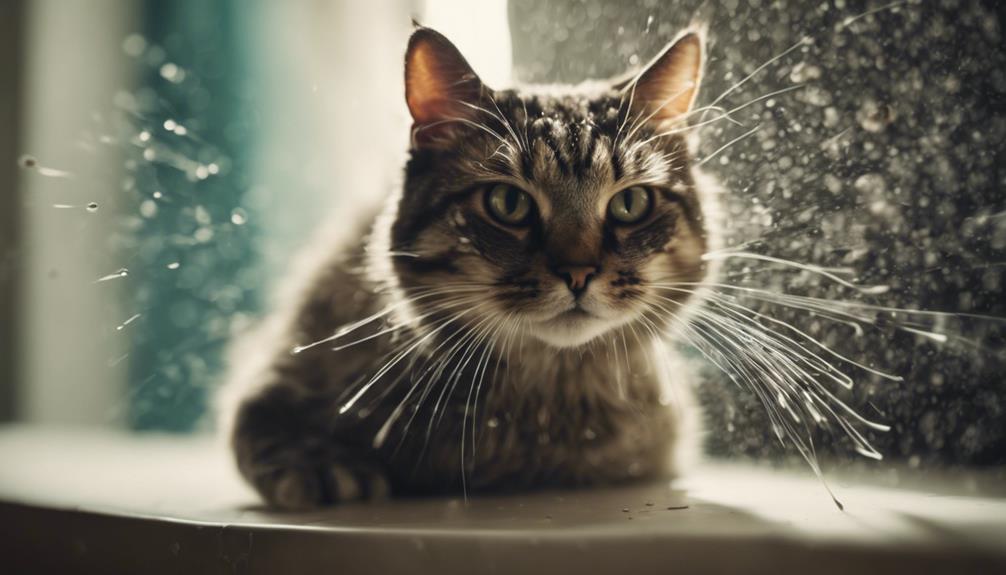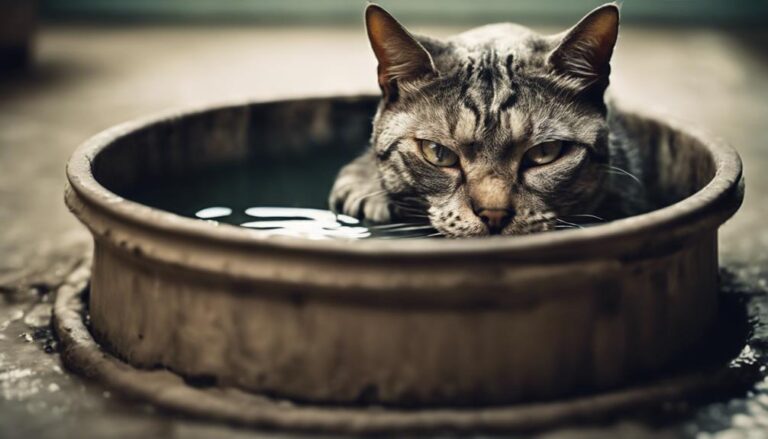If you've ever caught a whiff of cat spray, you know it's not a pleasant scent. The smell can linger and be quite challenging to eradicate if not handled correctly. You might wonder, what exactly gives cat spray its unique odor, and more importantly, how can you effectively eliminate it from your home? Understanding the distinct qualities of cat spray smell and learning the proper techniques to combat it can make a significant difference in maintaining a fresh and odor-free environment.
Identifying the Cat Spray Smell
If you catch a whiff of a pungent, ammonia-like scent lingering in your home, you may be identifying the distinct smell of cat spray. Cat spray is a combination of odors that can be described as musky, sulfur-like, and predominantly ammonia-based. When a cat sprays, they're marking their territory and communicating with other felines in the area. The ammonia present in the spray is what usually stands out the most, giving it that sharp and penetrating smell.
Neutering or spaying your cat can often help reduce or eliminate the behavior of cat spraying, as it's commonly linked to hormonal reasons. Understanding why your cat is spraying is crucial in effectively addressing the smell. By tackling the root cause, you can work towards preventing the scent from permeating your home. Remember, cat spray isn't just about the smell; it's a form of feline communication and territorial behavior that can be managed with the right approach.
Understanding the Odor Source
When it comes to understanding the source of that strong cat spray smell, you need to start by identifying the components involved.
Recognizing territorial behavior is key to comprehending why your cat may be spraying.
Additionally, considering any underlying litter box issues can shed light on the reasons behind this behavior.
Identifying Spray Components
To understand the source of the strong ammonia-like odor in cat spray, you must recognize the volatile compounds present in the spray. Cat spray can also have a musky or sulfur-like smell, which can vary between individual cats. This spray is used by cats for scent marking, a way of communication with other felines.
By identifying these components, such as the volatile compounds responsible for the distinct odors, you can develop an effective plan for odor removal. Knowing the specific elements contributing to the smell is essential for devising a targeted cleaning strategy.
Understanding the composition of cat spray is key to successfully tackling and eliminating the lingering odors in your home.
Recognizing Territorial Behavior
Recognizing territorial behavior in cats involves deciphering the purpose behind the distinct odor of their spray. Cat spray emits a strong ammonia odor, sometimes accompanied by a sulfur-like scent, serving as a means of communication to convey territorial information.
When your cat sprays, it's marking its territory with specific data-providing chemicals for other cats to interpret. Unlike regular urination, cats deposit less urine when they spray to mark their territory.
Understanding this behavior is key to effectively eliminating the lingering cat spray smell in your home. By recognizing the significance of cat spray as a form of communication and marking, you can take appropriate steps to address the odor and discourage further territorial behavior.
Litter Box Issues
Understanding the source of the strong ammonia-like odor in your home from cat spray related to litter box issues is crucial for effective resolution. Cat spray, particularly from unneutered male cats, can produce a pungent smell indicating territorial marking or dissatisfaction with the litter box. To address this, focus on proper litter box maintenance and consider any underlying cat behavior issues.
Regularly clean the litter box, ensuring it's in a quiet and accessible location. Additionally, observe your cat's behavior and consult with a veterinarian if necessary. By addressing litter box issues promptly and understanding the reasons behind the odor, you can create a more pleasant environment for both you and your feline companion.
Cleaning the Affected Area
Quickly and thoroughly cleaning the area where your cat has sprayed is crucial in preventing re-marking and eliminating the strong ammonia-like odor. Cat spray, which contains urine, pheromones, and other chemicals, serves as a way for cats to mark their territory or communicate with other felines.
To effectively clean the affected area, start by blotting up as much of the spray as possible using paper towels or a clean cloth. Avoid using ammonia-based cleaners, as they can amplify the odor and encourage re-marking. Instead, opt for enzymatic cleaners specifically designed to break down the proteins in cat urine and eliminate the odor at its source.
Scrub the area thoroughly with the enzymatic cleaner and allow it to air dry completely. Remember to be persistent in your cleaning efforts to ensure the complete removal of the cat spray odor and prevent your cat from re-marking the same spot.
Using Enzymatic Cleaners
To effectively eliminate the strong ammonia-like odor of cat spray and prevent re-marking, consider using enzymatic cleaners designed to break down urine compounds. Enzymatic cleaners contain specialized enzymes that target and break down the proteins present in cat urine, effectively neutralizing the odor at its source.
These cleaners are specifically formulated to eliminate the unpleasant smell left behind by cat spray. Not only do enzymatic cleaners help in removing the odor, but they're also safe to use on various surfaces such as carpets, upholstery, and fabrics.
Neutralizing the Pheromones
Neutralizing the pheromones present in cat spray is essential to deter cats from re-marking the same spot. Cat spray contains pheromones that contribute to its potent smell and can attract other cats to spray in the same area. To rid your home of the lingering cat spray smell and prevent future incidents, it's crucial to neutralize these pheromones effectively.
After cleaning the affected area with an enzymatic cleaner to remove the visible stains and odors, focus on targeting the pheromones that may still be present. Enzymatic cleaners break down these pheromones, eliminating the scent that encourages cats to spray in the same spot again. By neutralizing the pheromones, you can help deter your cat from re-spraying in the area, reducing the likelihood of repeat incidents.
Make sure to thoroughly clean and neutralize the pheromones to discourage your cat from marking the same spot in the future.
Preventing Future Spraying
To prevent future spraying behavior in cats, consider spaying or neutering your pet as a proactive measure. This can significantly reduce or even eliminate the tendency to spray due to hormonal influences. Additionally, here are some practical steps you can take to prevent spraying behavior:
- Provide multiple litter boxes: Offering several litter boxes in different areas of your home can help deter territorial marking and encourage appropriate bathroom habits.
- Use pheromone diffusers: These diffusers release calming pheromones that can reduce stress in cats, potentially decreasing the likelihood of them spraying to mark their territory.
- Maintain cleanliness: Regularly cleaning and maintaining litter boxes can make them more appealing to your cat and discourage inappropriate spraying.
- Consult a vet: Seeking advice from a veterinarian is crucial in addressing spraying behavior. They can provide guidance on preventing spraying and offer solutions tailored to your cat's specific needs.
Frequently Asked Questions
How Can I Get Rid of Cat Spray Smell?
To get rid of cat spray smell, use enzyme-neutralizing cleaners. Avoid bleach or ammonia-based products. Try natural remedies like vinegar and baking soda. Thoroughly clean to eliminate odor and prevent re-marking. Proper cleaning is key.
How Long Does Cat Spray Smell Last?
Cat spray smell can linger for days to weeks, especially in porous surfaces. Adequate cleaning with enzymatic cleaners and proper ventilation is essential. The intensity of the odor determines how long it lasts.
How Do You Get Rid of Stinky Cat Smell?
To get rid of stinky cat smell, clean the area promptly with natural cleaners like baking soda. Ensure it's fully dry and ventilated to banish odors. Don't let it linger; act fast for a fresh space.
Will Bleach Get Rid of Cat Spray Smell?
Bleach won't effectively eliminate cat spray smell. It may mask it temporarily, but could attract cats to re-spray. Opt for enzyme-neutralizing cleaners or natural remedies. Avoid bleach to prevent re-marking behavior and setting the odor.






